Gisella Mathews
Gisella Mathews was a true pioneer of the English language dubbing scene in Rome. Ever since the start back in 1947 and for more than fifty years, this brilliantly multi-talented lady was involved with everything from adaptations to directing, to synchronization and of course voice dubbing. If the name and face is unfamiliar to you then the voice is surely not, for Gisella was one of the top character dubbers, and her curiously accented voice has given life to countless hot-tempered and fast-talking Italian working-class mothers, doting housekeepers, cruel reverend mothers and whiny old hags just to mention a few. Check out the video below for a few samples of her excellent voice work:
Unfortunately, there is not much biographical information available on Gisella. According to the (not always reliable) Internet Movie Database, she was born on December 14, 1919, but with no country of birth listed. Some of her dubbing colleagues remember her as originally being from Germany, but when featured in a small article in the Grimsby Evening Telegraph in 1959, Gisella described herself as being “half English, half Italian”, while noting that she cultivated an American accent for her job.
When and how she ended up in Rome is also not clear, but what we do know is that Gisella spent most of her adult life there, and thanks to her fluency in both English and Italian, she found employment with Eagle-Lion Productions, translating American films into Italian for dubbing. In 1947, she was approached about whether she’d be interested in trying to dub an Italian film into English. The film in question was Alessandro Blasetti’s popular drama-comedy Four Steps in the Clouds (1942), which the producers sought to profit further from by selling it abroad in a dubbed version. Gisella took on the assignment, and Four Steps in the Clouds became one of the first-ever films to be dubbed into English in Rome.
 |
| Four Steps in the Clouds (1942). |
Soon, Gisella received offers from other Italian companies who wanted their products dubbed into English, and by October of 1949, the demand was such that she and an Italian theater actor named Valentino Bruchi (who spoke perfect English due to having an English mother) got together to found the Anglo-American Dubbing Association, a non-profit organization set up to provide English voices for the dubbing of Italian films.
Those were the faint beginnings of the English dubbing scene in Rome, and Gisella was right at the center of it from the very beginning, working on adaptations as well as directing the dubbing sessions.
 |
| From the credits of The Fighting Men (1950), showing Gisella being credited with assisting fellow dubbing veteran Lewis E. Ciannelli with the English adaptation. |
 |
| From the credits of Pietro Germi's famous Four Ways Out (1951) in which Gisella receives a credit as dialogue director in the English opening titles. |
Additionally, Gisella also tried her luck as an actress in front of the camera, and she landed her best and most widely-seen role in 1952, when she was cast in the antagonistic role of the Marquise Altamirano in Jean Renoir’s famous The Golden Coach (1952), starring Anna Magnano.
She followed this up with guest starring roles in Conrad Nagel Theater and The Three Musketeers, two international TV series produced in Rome which are now, unfortunately, almost impossible to find, and then a small part in the romantic musical film For the First Time (1959), the final film of famed tenor star Mario Lanza.
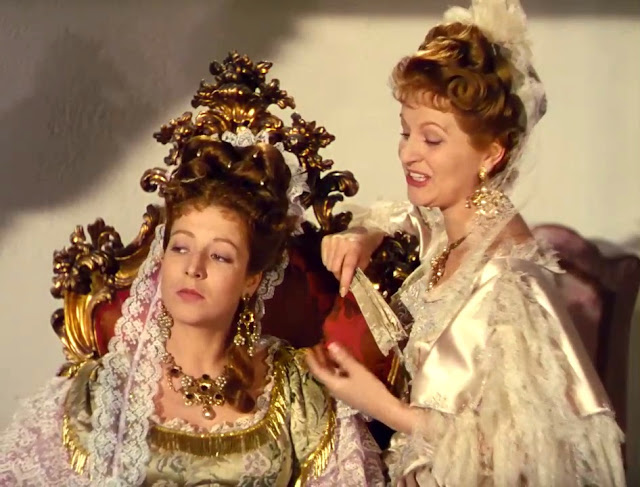 |
| Gisella in Jean Renoir's The Golden Coach (1952). |
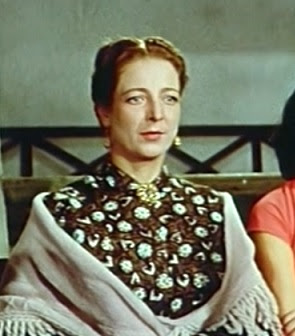 |
| Gisella in For the First Time (1959). |
Like many of the classic English dubbers, Gisella also picked up some extra work by teaching English to Italian actors, and her most famous client was none other than the renowned actor and director Vittorio De Sica. Gisella acted as both secretary and dialogue coach to De Sica, accompanying him to movie sets to help him with his English line delivery when he occasionally appeared in international productions, such as A Farewell to Arms (1957), a Hollywood production with Rock Hudson and Jennifer Jones, shot on location in Italy and at the famed Cinecittà studios, and in which Gisella also played a small uncredited role as a hospital nurse.
 |
| Gisella as a nurse in A Farewell to Arms (1957). |
In 1959, De Sica, in an attempt to broaden his international appeal, accepted one of the leading roles in the British adventure TV series The Four Just Men. Gisella was there to coach De Sica through the production of the series, which unlike A Farewell to Arms, was shot in England.
 |
| Gisella with Vittorio De Sica, going through a script for the TV series The Four Just Men (1959). |
Another job at which Gisella excelled was as a so-called sync assistant (sometimes also referred to as sala assistant). Whereas the dubbing directors are in charge of the artistic content such as the casting of the voices and their performances, a sync assistant is in charge of the technical direction and making sure that the dubbers start and finish on time and get the rhythm or length of each line down correctly. Gisella was a long-time sync assistant, and thanks to her sharp eye for synchronization, she was much in-demand with many of the great dubbing directors.
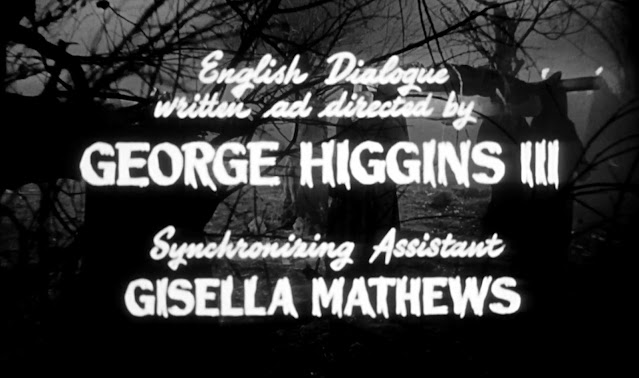 |
| Mario Bava's famous The Mask of Satan (1960) was one of the very rare occasions where Gisella received an on-screen credit for her sync assistant work. |
Gisella also continued to work as a dubbing director, and in 1971 she directed the English dubbing of Leobunny, an Italian series of animated TV shorts for children about a little lion cub who is adopted by a family of rabbits. Originally titled Le avventure di Leoniglio, the series was animated and written by Sergio Minuti, and has unfortunately faded into complete obscurity, with no English dubbed episodes known to be in circulation anywhere.
 |
| If you're very lucky, you might be able to track down a few Italian language episodes of Leobunny on 8mm. |
The work for which most fans of Italian cinema will remember Gisella, however, is of course for her voice dubbing work. The earliest dubbing role I have found for her is in Pietro Germi’s crime film Four Ways Out (1951). Gisella directed the film’s English dubbing and also cast herself as the voice of British starlet Tamara Lees, who plays a little cameo role in the film.
Here you can watch a little video of Gisella dubbing Tamara Lees in English:
The earliest subsequent dubbing roles I’ve found for Gisella are from 1968, from which point she regularly dubbed voices for character parts. That’s quite a huge gap between 1951 and 1968, however, and the reason for it is not known, but it should be noted that Gisella was never among the most prolific dubbers, and she may well have preferred to work with synchronization, and thus devoted most of her work in the 1950s and 60s to that and only dubbed voices when there was a small part for which she was a good fit. Dubbing director Gene Luotto looks to have been rather a fan of Gisella, though, and often cast her in meaty character parts on the dubs he directed – most notably as the hot-tempered mother played by Pupella Maggio in Federico Fellini’s Amarcord (1973). Indeed, it is in comical parts as highly emotional, meddlesome and fast-talking Italian mammas that Gisella was most frequently cast – presumably because this was seen as fitting well with the slight but rather peculiar accent with which she always spoke.
 |
| Pupella Maggio in Amarcord (1973) was the most famous performance dubbed by Gisella. |
She was, however, a great and highly versatile actress capable of tackling a variety of different roles, both comedic and dramatic, and in the clip below you’ll get a sample of Gisella bringing a series of colorful and very different mothers – and other types – to life:
Many of the roles dubbed by Gisella were small bit parts that only appeared in a single scene. It is therefore a true testament to her talent and abilities that she still managed to stand out, and here are a few great examples of minor characters that were made memorable due to Gisella’s wonderful voice:
After a long break, Gisella began to make on-screen appearances in films and on television again in the 1980s – both in international productions shot in Italy as well as in Italian productions in which she recited her own lines in Italian.
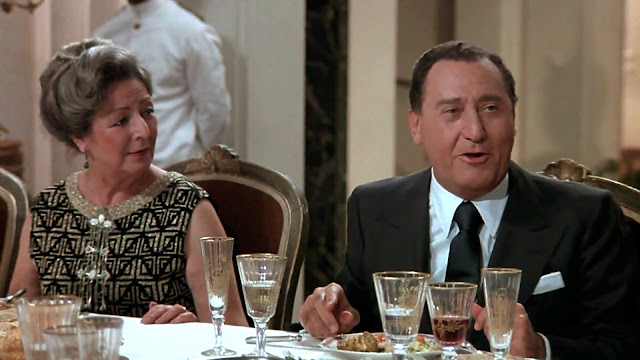 |
| With Alberto Sordi in Sono un fenomeno paranormale (1985) in which Gisella speaks her own dialogue in Italian. |
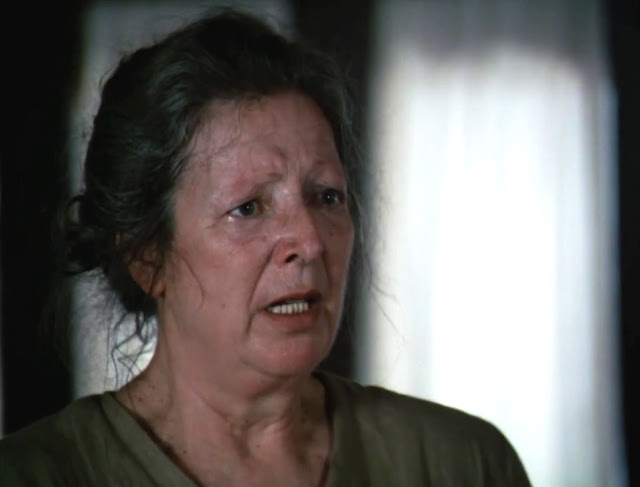 |
| An unglamorous part as a hostage in Voyage of Terror: The Achille Lauro Affair (1990). |
 |
| With Nino Manfredi in an episode of the TV series Linda e il brigadiere in 1997. |
Here is a little video featuring scenes from a few of Gisella’s on-screen appearances:
The decline of the Italian film industry in the 1980s and 90s affected the English dubbing scene as well, with work starting to dry up. Gisella was one of the old pros who stuck at it, though, with her most recent credit coming as late as in 2000, when she dubbed the role of the evil stepmother in the infamous animated film Titanic – The Legend Goes On – widely regarded as one of the worst films of all time.
 |
| Titanic - The Legend Goes On... was a rare credited voice role for Gisella. |
It was to prove one of the last projects that Gisella worked on. She passed away on the 30th of May the following year at age 81, thus marking the end to a career in dubbing that spanned more than 50 years! Her uniquely memorable contributions to the English dubbing of Italian films live on, though, and will most definitely not be forgotten.
Dubbing actor Rodd Dana often worked with Gisella and remembered her fondly when I asked him about her: “Beautiful human being! German origin, but spoke refined English, however. I seem to recall she lived in Rome most of her adult life, and may have died there, too. I did a lot of work with her. She did sala assistant work for many directors, and could see sync like few others. Wonderful actress!”
Dubbing actress Geneviève Hersent, who was involved with both French, Italian and English dubbing in Rome, was a near and dear friend of Gisella and remembered her old friend with much affection: “Another best friend was Gisella Mathews. She lived close to my place (in Monte Sacro) in Rome, and she loved her two big dogs (German Shepherds) so much. I think she was born in Germany. She directed me in the cartoon Leobunny that I also dubbed in French as Léopinpin and in Italian as Leoniglio. She said that my French accent disappeared when I made funny voices like that rabbit who thought he was a lion. For years, Gisella continued to privately call me ‘Léopinpin’. Gisella was fluent in four languages: English, Italian, German and French. She came from time to time at French dubbing with us, but not so often, since I was able to make all kinds of voices myself.”
Below is the English dubbing filmography I’ve compiled for Gisella. As always, these filmographies are works in progress, and I’ll be adding to it as I come across further roles.
English dubbing filmography:
- Four Ways Out (1951) - voice of The Woman from the Portrait (Tamara Lees)
- Be Sick... It’s Free (1968) - voice of Nurse Paola (Gianna Dauro)
- A Stranger in Paso Bravo (1968) - voice of Paquito’s Wife (Josefina Serratosa)
- Naked Violence (1969) - voice of Benito’s Aunt (Flora Carosello)
- The Nun of Monza (1969) - voice of Sister Angela (Giovanna Galletti)
- Amarcord (1973) - voice of Miranda (Pupella Maggio)
- Women in Cell Block 7 (1973) - voice of Prison Matron (Elisa Mainardi)
- Blood Brothers (1974) - voice of Amalia Scognamiglio (Rosalia Maggio)
- Conversation Piece (1974) - voice of Erminia (Elvira Cortese)
- The Killer Wore Gloves (1974) - voice of Anthony’s Wife (Irene D’Astrea)
- Last Moments (1974) - voice of Sister Maria (Lina Volonghi)
- Up With Us!! (1974) - voice of Rosa (Franca Scagnetti)
- How to Kill a Judge (1975) - voice of Lipari’s Sister (unidentified actress)
- Husband Italian Style (1975) - voice of Rosalia’s Mother (Grazia Di Marzà)
- Love Under the Elms (1975) - voice of Hella’s Mother (Janine Simona)
- Too Young to Die (1975) - voice of Giannino’s Mother (Franca Scagnetti)
- The Au Pair Girl (1976) - voice of Ersilia (Alessandra Vazzoler)
- Fear in the City (1976) - voice of Concierge (Franca Scagnetti)
- The Inheritance (1976) - voice of Matilde (Rossana Di Lorenzo)
- Love by Appointment (1976) - voice of Ro' (Jole Fierro)
- My Father’s Wife (1976) - voice of Prostitute (Gabriella Giorgelli)
- Soldier of Fortune (1976) - voice of Mariano’s Mother (Nerina Montagnani)
- Werewolf Woman (1976) - voice of Witness (unidentified actress)
- A Whisper in the Dark (1976) - voice of Giovanna (Margherita Sala)
- Beyond Good and Evil (1977) - voice of Franziska (Elisa Cegani)
- The Gestapo’s Last Orgy (1977) - voice of Bertha Golden (off-screen character)
- In the Beach House (1977) - voice of Teresina’s Grandmother (Flora Mastroianni)
- The Swindle (1977) - voice of Franco Venticello’s Mother (unidentified actress)
- Behind Convent Walls (1978) - voice of Abbess Flavia Orsini (Gabriella Giacobbe)
- Blood Feud (1978) - voice of Rosario’s Mother (Maria Carrara)
- The Coming of Sin (1978) - voice of Fortune Teller (unidentified actress)
- Convoy Busters (1978) - voice of Augusto’s Mother (Alba Maiolini)
- Atrocious Tales of Love and Death (1979) - voice of Donna Filomena (Elena Fiore)
- The Nurse in the Military Madhouse (1979) - voice of Sister Fulgenzia (Ermelinda De Felice)
- Saturday, Sunday and Friday (1979) - voice of Enza’s Mother (Margot Cottens)
- Target (1979) - voice of Cengiz’s Mother (Saziye Moral)
- City of the Living Dead (1980) - voice of Mrs. Robbins (unidentified actress)
- The Warning (1980) - voice of Signora Vella (Deddi Savagnone)
- Caligula and Messalina (1981) - voice of Messalina’s Mother (Fanny Magier)
- Pierino Against the World (1981) - voice of Pierino’s Mother (Deddi Savagnone)
- Who Finds a Friend Finds a Treasure (1981) - voice of Mama (Louise Bennett)
- Don’t Play with Tigers (1982) - voice of Adalgisa Balloni (Annabella Schiavone)
- Malamore (1982) - voice of Leni Grundt (Elisabeth Kaza)
- Pieces (1982) - voice of Neighbor (unidentified actress)
- The Scorpion with Two Tails (1982) - voice of Professor Sorenson (Anita Laurenzi)
- Verdi (1982) (TV mini-series) - voice of Maria Barezzi (Adriana Innocenti)
- Violence in a Women’s Prison (1982) - voice of Pilar (Leila Durante)
- Spy Connection (1983) - voice of Maria (Dolores Calò)
- Hell Behind Bars (1984) - voice of Margot (unidentified actress)
- Hell Penitentiary (1984) - voice of Mrs. Trudeau (Adriana Giuffrè)
- Mussolini and I (1985) (TV mini-series) - voice of Carolina Ciano (Micaela Giustiniani)
- The Sicilian Connection (1985) - voice of Mario’s Mother (unidentified actress)
- Bridge to Hell (1986) - voice of Reverend Mother (unidentified actress)
- The Corruption (1986) - voice of Giacomo’s Mother (Ida Eccher)
- The Devils of Monza (1987) - voice of Reverend Mother (Alina De Simone)
- Good Morning, Babylon (1987) - voice of The Venetian (Margarita Lozano)
- Iron Warrior (1987) - voice of Phoedra (Elisabeth Kaza)
- Love & Passion (1987) - voice of Diomira (Dodi Moscati)
- Phantom of Death (1988) - Robert’s Mother (Caterina Boratto)
- The Belt (1989) - Professor Biondelli’s Wife (Delia D’Alberti)
- Laurin (1989) - voice of Olga (Hédi Temessy)
- The Man Who Didn’t Want to Die (1989) - voice of Fabrizio’s Mother (unidentified actress)
- Valentina (1989) (TV series) - ep. 4: “Valentina Does Not Rest” - voice of Hotel Guest (unidentified actress)
- The Cave of the Golden Rose (1991) (TV mini-series) - voice of Cook (Antonie Hegerlíková)
- Craving Desire (1993) - voice of Cinzia’s Mother (unidentified actress)
- Olga O’s Strange Story (1995) - voice of Maya (Slava Racheva)
Animation dubbing:
- Titanic – The Legend Goes On... (2000) - voice of Gertrude
This page was last updated on: February 7, 2025.
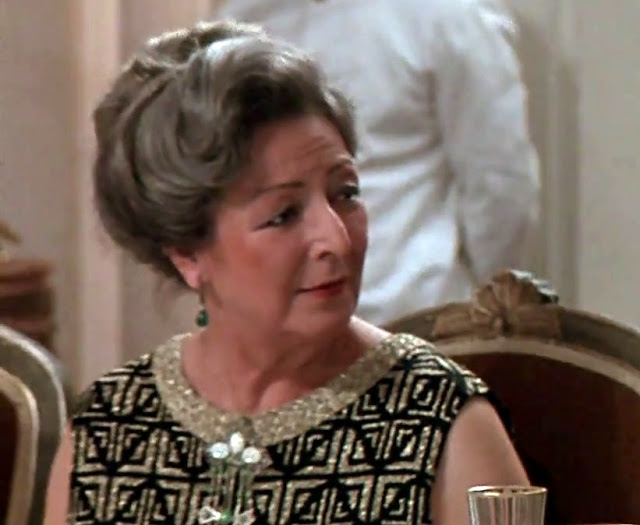
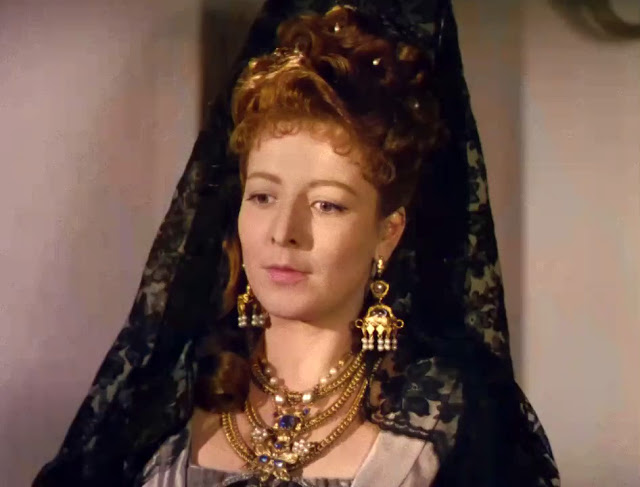
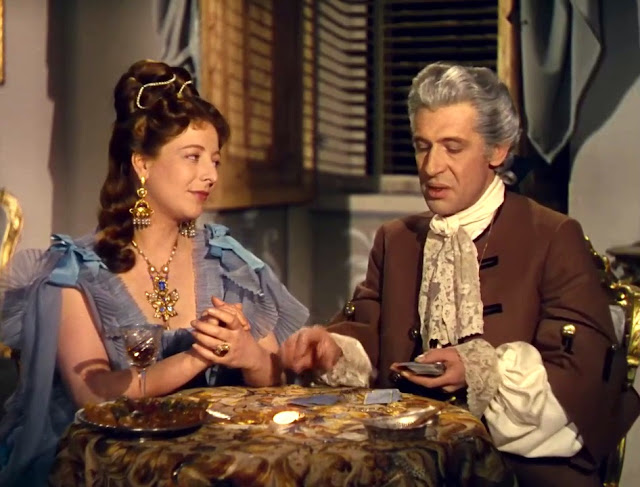





.jpg)



Great work as always! We see that she dubbed the housekeeper lady from SUSPIRIA a couple of times and worked closely with Tony La Penna as well.
ReplyDeleteThank you! Yes, Franca Scagnetti. That was a good face-voice match, I think, although she really managed to fit all the characters she dubbed quite well. I'm sure Gisella also worked for Tony La Penna as sync assistant, but sadly, English dubbing credits tend to be very sparse or even non-existent...
ReplyDelete